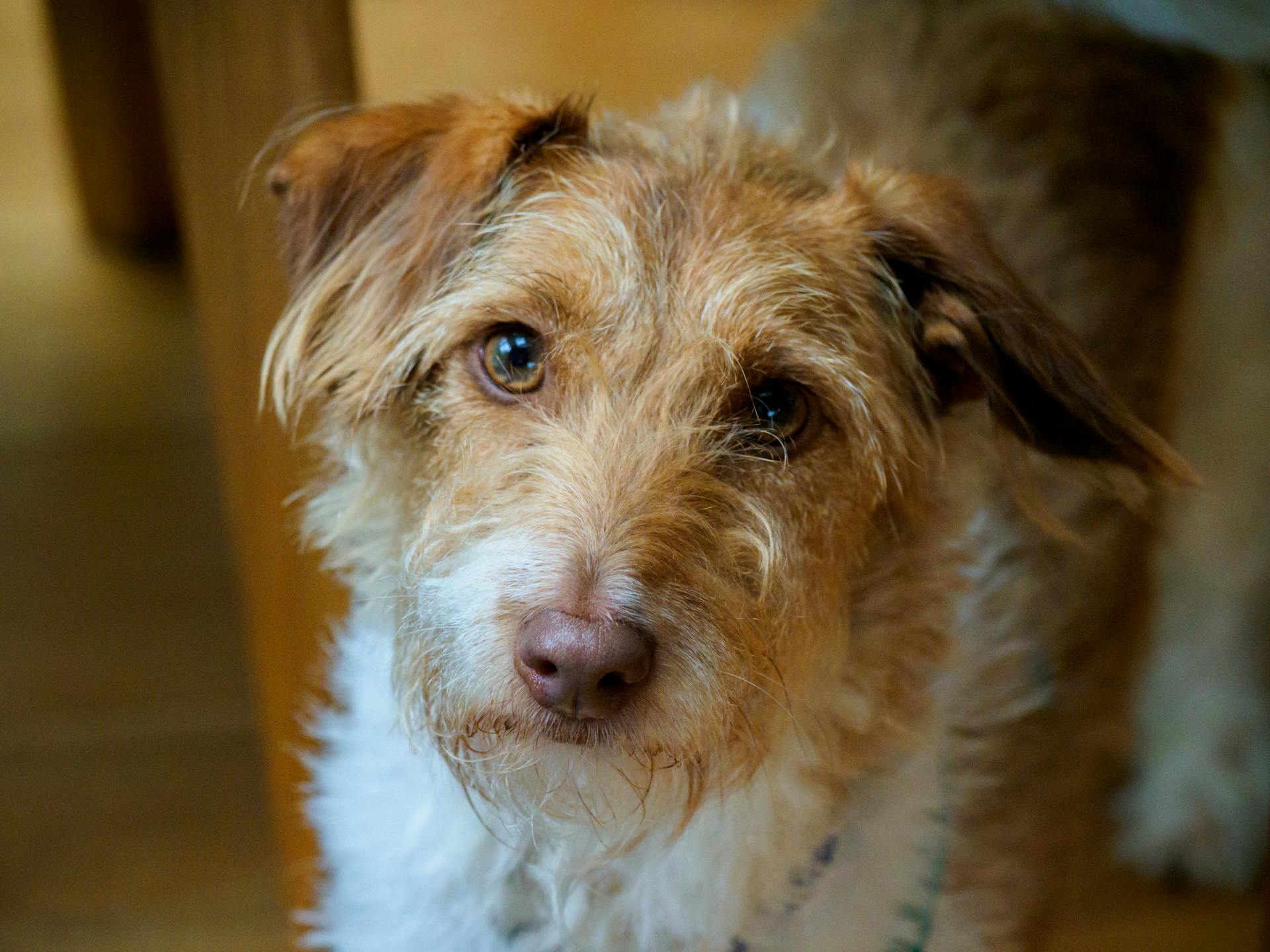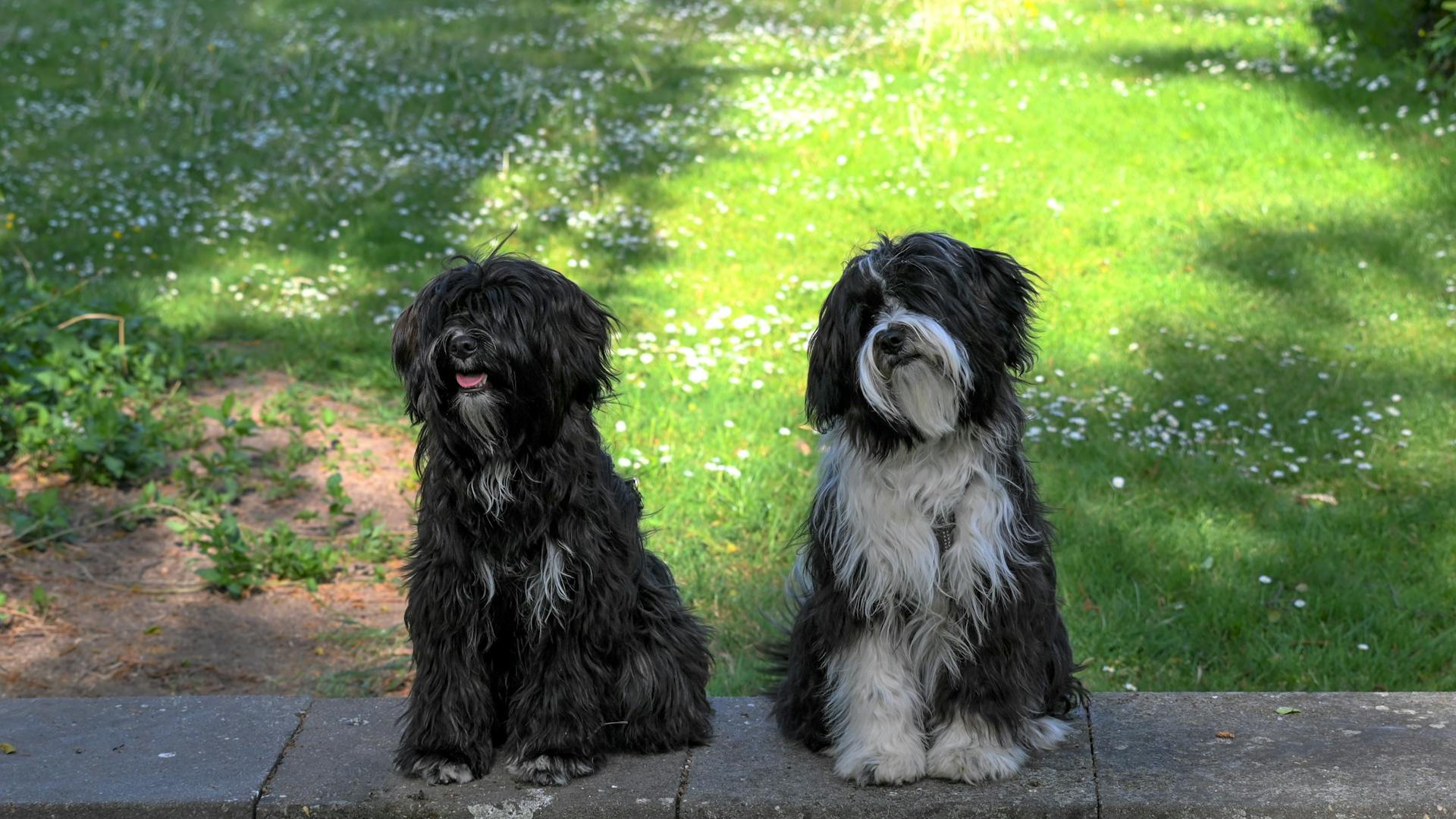
The Portuguese Podengo is a rare and ancient breed that originated in Portugal, with a history dating back over 1,000 years. They were originally bred to hunt small game such as rabbits and hares.
These dogs are highly energetic and require regular exercise to stay happy and healthy. This means they need at least 30 minutes of exercise per day, which can be a challenge for busy owners.
Their short coats require minimal grooming, but they do need regular nail trimming and ear cleaning to stay healthy. This is a relatively low-maintenance breed when it comes to grooming.
With patience and consistency, the Portuguese Podengo can thrive in a variety of living situations, from apartments to homes with yards.
Care and Feeding
Providing regular veterinary checkups is crucial to detect any health concerns early on in your Portuguese Podengo Pequeno's life.
You should keep up with your pup's daily routine, which includes at least one hour of walking and a few active play sessions, to prevent weight gain. Their high energy and active lifestyle will naturally prevent them from gaining too much weight.
Daily ear and eye checks are essential to maintain your dog's overall health, and you should clean them as recommended by your vet. Trim your dog's nails before they get too long, usually once or twice a month, to prevent clicking against the floor.
Brushing your Portuguese Podengo Pequeno's teeth daily is vital to prevent dental issues, especially since small breeds are prone to them. Your veterinarian can instruct you on how to brush your dog's teeth properly.
An ideal diet for your Portuguese Podengo Pequeno should be formulated for a small breed with high energy. Stick to a regular feeding schedule and limit treats to avoid overfeeding, which can lead to weight gain and obesity-related health issues.
On average, an adult Podengo Pequeno might consume between 1/2 to 1 cup of high-quality dry dog food daily, split into two meals. However, this can vary based on your dog's individual needs and activity level, so it's essential to consult with your veterinarian for personalized recommendations.
Curious to learn more? Check out: Portuguese Podengo Pequeno Wirehaired
High or Low Maintenance?
Portuguese Podengo Pequenos are moderate in terms of maintenance.
Their grooming needs vary depending on whether they have a smooth or wire-haired coat, with the latter requiring more attention.
Regular exercise is a must to keep them happy and healthy.
Feeding
Feeding your Portuguese Podengo Pequeno is a crucial part of their care, and it's essential to get it right.
A high-quality diet with plenty of protein is the best choice for this breed.
Stick to a regular feeding schedule and avoid leaving food out during the day, as overfeeding can lead to weight gain.
Puppies need a balanced diet that supports their rapid growth phase, with many owners choosing specially formulated puppy foods.
Adult Podengo Pequenos typically need fewer calories per pound than their younger counterparts, but their activity level heavily influences their caloric needs.
Active adults might require more energy-dense foods, while less active or older dogs might benefit from a diet with fewer calories to prevent unwanted weight gain.
On average, an adult Podengo Pequeno might consume between 1/2 to 1 cup of high-quality dry dog food daily, split into two meals.
Treats should constitute no more than 10% of the dog's daily caloric intake to maintain a balanced approach.
Regular weight checks and body condition assessments can guide any necessary adjustments to the feeding routine, ensuring your dog remains at a healthy weight and optimal condition throughout their life.
It's beneficial to consult with a veterinarian or a pet nutritionist to determine the most appropriate feeding regimen for your Podengo Pequeno.
Check this out: Portuguese Podengo Pequeno Puppies
Health and Wellness
The Portuguese Podengo Pequeno is generally a healthy breed with a robust constitution. With proper care and regular veterinary check-ups, many can live long and fulfilling lives, with an average lifespan of 12 to 15 years.
Regular veterinary check-ups are crucial to monitor and address any developing issues early on, ensuring the preservation of their visual health. Eye conditions, such as progressive retinal atrophy (PRA) or cataracts, can be a concern for this breed.
Hip dysplasia is a condition that can affect the Portuguese Podengo Pequeno, involving an abnormal development of the hip joint. Regular veterinary check-ups and maintaining a healthy weight can contribute to managing and preventing hip dysplasia.
Patellar luxation, a condition where the dog's kneecap becomes dislocated, can be painful and may lead to lameness. Regular veterinary checks can identify early signs of the condition.
To minimize the risk of health issues, it's essential to build a relationship with a dog's breeder and a trusted veterinarian. Scheduling regular health screenings can offer any Portuguese Podengo Pequeno a long, happy and healthy life.
Here are some common health issues to be aware of in the Portuguese Podengo Pequeno breed:
- Hip dysplasia: a condition that occurs when a dog's hip joints grow with malformations as they age.
- Glaucoma: a condition that can cause pain and blindness, requiring early detection and treatment.
- Cataracts: a cloudy film over the dog's eyes that can typically be removed through surgery to restore sight.
- Luxating patellas (also known as trick knees): a condition that affects the dog's knees, requiring surgery in severe cases.
By being proactive and aware of these potential health risks, you can provide the best possible care for your Portuguese Podengo Pequeno and ensure a happy and healthy life together.
Training and Behavior
The Portuguese Podengo Pequeno is a highly intelligent breed that thrives on mental and physical stimulation. They require regular exercise of 20 to 30 minutes daily, on leash, plus free play in a well-fenced yard.
Consistency is key when training a Podengo, and positive reinforcement methods work exceptionally well with this breed. They respond well to praise, play, and food rewards, making training sessions a fun and engaging experience for both you and your dog.
Their alert nature means they can be vocal, and they may bark to alert their owners of any perceived threats or unfamiliar happenings. Proper training from a young age can help to manage excessive barking and ensure it doesn’t become a problematic behavior.
Early socialization is essential for a well-rounded and confident adult dog, and exposing them to various environments, people, and other animals during their formative months can help to cultivate a friendly and outgoing personality.
Incorporating puzzle toys, agility training, and trick training can be beneficial in keeping their minds engaged and preventing boredom. This breed is quick to learn and can excel in various dog sports, such as agility and lure coursing.
Their inherent prey drive means they might be inclined to chase after small animals, so training them with a strong recall command and ensuring safe, enclosed spaces for off-leash play can mitigate potential risks associated with this trait.
Worth a look: Border Collie Dog Agility
Exercise
The Portuguese Podengo Pequeno is an active and lively breed that requires regular exercise to stay happy and healthy. They have a medium to high energy level, which means they need at least an hour of exercise per day.
Daily walks are a must, and a spacious fenced-in backyard is ideal, but not required, as long as they're getting plenty of other activity every day. The breed's heritage as hunting dogs has imbued them with a zest for life, which means they have a relatively high exercise requirement.
A mix of activities is beneficial for this breed, including brisk walks, playtime, and interactive games. They enjoy sprinting, playing fetch, and engaging in interactive games, and their agility and speed make them excellent candidates for agility courses.
Their energy level is consistent throughout their life, though it might decrease slightly as they transition into their senior years. However, even older Podengo Pequenos will appreciate a daily dose of activity to keep their joints limber and their spirits high.
Worth a look: What Is the Lifespan of a Boston Terrier Dog
Here are some recommended activities and dog sports suitable for the Portuguese Podengo Pequeno:
- Agility: Their nimbleness and speed make them excellent candidates for agility courses.
- Lure Coursing: Given their hunting roots, lure coursing is a sport that appeals to their instinctual drive to chase.
- Barn Hunt: This activity taps into their keen sense of smell and natural vermin-hunting instincts.
- Scent Work: Another scent-based activity, nose work challenges dogs to identify and locate specific scents in various environments.
- Rally Obedience: This sport combines aspects of obedience and agility.
- Earthdog: Designed primarily for small terrier breeds and dachshunds, Earthdog trials can also be suitable for the Podengo Pequeno.
- Flyball: Their speed and enthusiasm make them potential contenders in flyball teams.
- Conformation Shows: As a recognized breed, the Portuguese Podengo Pequeno often participates in conformation shows.
- Therapy Work: Given their friendly and gentle nature, with proper training, some Portuguese Podengo Pequenos can be effective therapy dogs.
Grooming and Appearance
The Portuguese Podengo Pequeno's grooming needs are relatively low-maintenance. Their coats are often light, medium, or dark yellow or fawn, with some possible markings, and come in two varieties: smooth and harsh, wiry.
Regular brushing is essential to keep their coat looking its best. A weekly brushing will suffice for smooth-coated Podengo Pequenos, while wiry-coated ones require brushing every few days to remove dirt and debris.
There are two main coat types: smooth and wirehaired. The smooth coat is short and very dense, while the wirehaired coat is longer and rougher. Here's a brief rundown of grooming requirements for each coat type:
Bathing should be done only when necessary, and it's essential to use a dog-specific shampoo to avoid stripping their coat of its natural oils.
Grooming
Grooming is an essential part of caring for your Portuguese Podengo Pequeno. The breed's coat type plays a significant role in determining grooming needs.
The Portuguese Podengo Pequeno can have two types of coats: smooth and wirehaired. The smooth coat is short and very dense, while the wirehaired coat is longer and rougher.
Regular brushing is necessary to keep the coat looking its best. For smooth-coated Podengo Pequenos, a weekly brushing using a soft-bristle brush or a grooming mitt is typically sufficient. This helps to remove loose hair and distribute the natural oils of the skin.
Wirehaired Podengo Pequenos require more attention. They should be brushed every few days using a slicker brush or a pin brush to remove dirt and debris, prevent matting, and keep the coat tidy.
Bathing is only necessary when the dog becomes particularly dirty or has an unpleasant odor. Overbathing can strip the coat of its natural oils, leading to dry skin and potential irritation.
In addition to coat care, regular nail trimming is essential, especially if they don’t naturally wear down their nails through activity. Check their ears periodically for signs of infection or wax buildup, cleaning them gently with a dog-approved ear cleaner when necessary.
Here's a summary of the grooming requirements for your Portuguese Podengo Pequeno:
By following these grooming tips, you can help keep your Portuguese Podengo Pequeno looking and feeling its best.
Tail
The tail of the Portuguese Podengo Pequeno is a distinctive feature that's worth noting. It's set medium-high on the topline, with a thick base that tapers towards the tip.
The tail is lightly feathered on the underside, which adds a touch of softness to its overall appearance.
In movement, the tail is curved and carried upwards, though it should never curl over the back.
Living with a Podengo
Living with a Podengo can be a delightful experience, but it's essential to understand their unique needs. They thrive on human interaction and can become deeply attached to their family members.
Their energetic and curious nature requires regular exercise and mental stimulation, even in smaller living quarters. A securely fenced yard can be a bonus, offering them a safe space to explore and release their pent-up energy.
Accommodating a Podengo's need for companionship is crucial, as they don't prefer being left alone for extended periods. Leaving them alone can result in feelings of loneliness or anxiety, so it's vital to have provisions in place, like interactive toys or a companion animal, to keep them company.
Their robust build and dense coat allow them to handle various weather conditions, but they still need protection from extreme temperatures. In hot weather, providing shade, fresh water, and avoiding strenuous exercise during peak temperatures is a must.
Overall, living with a Podengo requires patience, consistency, and understanding of their needs and personality. With the right care and attention, they can become loving and loyal companions.
Living with
Living with a Podengo requires some consideration, but it's definitely worth it. They're adaptable to smaller living spaces, but they do need regular exercise and mental stimulation.
Their robust coat can handle various weather conditions, but extreme temperatures should be avoided. Prolonged exposure to freezing temperatures isn't advisable, and in hot weather, they need plenty of shade, fresh water, and to avoid strenuous exercise during peak temperatures.
A securely fenced yard can be a bonus, providing them with a safe space to explore and release their pent-up energy. However, they don't demand expansive spaces, and provisions for regular play and activity are essential, even in smaller living quarters.
Their curious and alert nature makes them excellent watchdogs, alerting their owners to unfamiliar sounds or movements around the home. Proper socialization is essential to ensure they don't become overly wary or aggressive towards visitors or unfamiliar stimuli.
Bonding and companionship are significant aspects of living with a Podengo. They thrive on human interaction and can become deeply attached to their family members, so leaving them alone for extended periods can result in feelings of loneliness or anxiety.
Here are some tips for creating a safe and stimulating environment for your Podengo:
- Puppy-proof your home by removing potential hazards.
- Provide a range of suitable toys to channel their energy and satisfy their need for mental stimulation.
- Ensure they have plenty of shade, fresh water, and rest during hot weather.
- Provide regular exercise and mental stimulation, even in smaller living quarters.
5 Tips for Bringing Home a Healthy Puppy
Finding a healthy Portuguese Podengo puppy requires some effort, but it's worth it. A good breeder is more important than finding the right puppy.
Research shows that a wait of six months to a year or more is common for this rare breed. So be patient and don't rush into getting a puppy.
Adopting an adult dog from a shelter or rescue group can be a great option. Many health problems in Podengos aren't apparent in puppyhood, and adopting an adult dog can rule out most of them.
Your veterinarian will be able to spot visible problems and set up a preventive regimen to avoid many health issues. Take your new puppy to the vet soon after adoption.
Make sure you have a good contract with the seller, shelter, or rescue group that spells out responsibilities on both sides. This will protect you and the dog in case of any issues.
Readers also liked: Shiba Inu 1 Dollar
Frequently Asked Questions
Are Portuguese Podengo good dogs?
Portuguese Podengos are excellent family dogs, exceling in pack work and interactions with children, but may require time to warm up to new people. They make loyal and loving companions for active families.
What is the most popular dog in Portugal?
The Portuguese Podengo is the national dog of Portugal, known for its energetic and active nature. This ancient breed has been a beloved companion in Portugal for centuries.
How much is a Portuguese Podengo Pequeno?
A Portuguese Podengo Pequeno typically costs between $1,000 and $2,000 from a reputable breeder, with prices varying based on location and family history.
Sources
- https://www.akc.org/dog-breeds/portuguese-podengo/
- https://dogtime.com/dog-breeds/portuguese-podengo-pequeno
- https://showsightmagazine.com/dog-breeds/portuguese-podengo-pequeno/
- https://www.embracepetinsurance.com/dog-breeds/portuguese-podengo
- https://www.thesprucepets.com/portuguese-podengo-pequeno-dog-breed-profile-4783579
Featured Images: pexels.com


